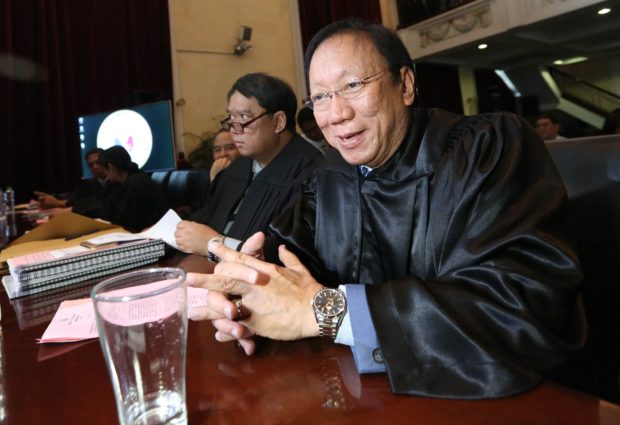Martial law is President’s ‘calling out power on steroids’—Calida

Solicitor General Jose Calida at the 1st day of the oral arguments at the Supreme Court on President Rodrigo Duterte’s declaration of Martial Law in Mindanao. INQUIRER/ MARIANNE BERMUDEZ
Martial law is President Rodrigo Duterte’s “calling out power on steroids,” lead government lawyer Jose Calida told the Supreme Court on Wednesday.
The President’s calling out power is the first of three measures mentioned under Sec. 18 Article VII of the 1987 Constitution that should be exercised to suppress lawless violence, invasion or rebellion.
Albay Representative Edcel Lagman, one of the anti-martial law petitioners, said this should be the first to be exercised, and only when it fails can the President proceed to the suspension of the privilege of the writ of habeas corpus while martial law is the last resort.
Chief Justice Maria Lourdes Sereno pointed out the cosmetic side-effects of taking steroids in apparent comparison to President Duterte’s martial law proclamation in Mindanao.
“Martial Law is the calling out power on steroids is very illuminating for me. What are the side effects of taking steroids? Acne, blurred vision, high blood, weight-gain… Steroids give the appearance of increased muscular presence. It can give the appearance of greater power [but] steroids do not address the ill,” the Chief Justice said.
Article continues after this advertisement“It is important for us to get the legal standards. We need to inoculate our armed forces from the possible idea that the armed forces are on steroids,” Chief Justice Sereno added.
Article continues after this advertisementRealizing his mistake in using such metaphor, Calida said, “Please do not take my phraseology literally. It is just a figure of speech. Don’t take me seriously on that.”
When asked by Senior Associate Justice Antonio Carpio on what powers does martial law give the President that he cannot do with his calling out power, Calida said the declaration of martial law is an “exclamation point” of the government in its fight against the Maute group.
“It is psychological, an exclamation point,” Calida said.
Calida said it would like “you listen to me now [because] I am imposing martial law.”
But Carpio said, “It’s ‘gulpi de gulat?’ But can you talk like that to the Maute Group? They will not be frightened.”
Associate Justice Mariano Del Castillo said there was not much difference between the two — calling out power and martial law, which are enshrined under Section 18 Article VII of the Constitution.
Calida maintained that all elements of rebellion — raising arms against the government and culpable purpose of removing allegiance from the government — are present in Mindanao.
“When he (Duterte) saw gravity of rebellion, he has to act swiftly and decisively to save Marawi… Were it not for the President’s swift action, the rebels would’ve established a stronghold in the heart of Mindanao,” he said.
The solicitor general cited “linkages” between Maute and other rebel groups in Mindanao, like Bangsamoro Islamic Freedom Fighter and Abu Sayyaf.
“The seeds of rebellion were already planted in different parts of Mindanao. Public safety requires the declaration of martial and suspension of privilege of habeas corpus not just in Marawi but in entire Mindanao,” he explained.
Calida also downplayed alleged human rights abuses raised by the Integrated Bar of the Philippines, Lanao del Sur chapter.
“President Duterte’s order of martial law is markedly different from that issued by President Marcos,” he assured.
Calida likewise raised technical issues on the three consolidated petitions by opposition lawmakers led by Albay Rep. Edcel Lagman, local Mindanao leaders led by Lumad leader Eufemia Campos Cullamat, and a group of women from Marawi led by Norkaya Mohamad seeking to strike down Proclamation No. 216.
He said the petitions have formal defects, citing their failure to specify the remedy being invoked for the SC to review the factual bases of the martial law proclamation.
The solicitor general argued that petitioners cannot just invoke the martial law provisions in the Constitution and should have instead filed petition for review under the Rules of Court.
“The discretion to proclaim martial law can only be questioned if President acted with grave abuse of discretion. The burden on petitioners is to show that declaration is bereft of merit and petitioners miserably fail to overcome this onus,” he alleged.
The oral argument will continue on Tuesday with Defense Secretary and Martial Law administrator Delfin Lorenzana and AFP Chief of Staff and martial law implementor Eduardo Año to appear as resource person in an executive session. JE